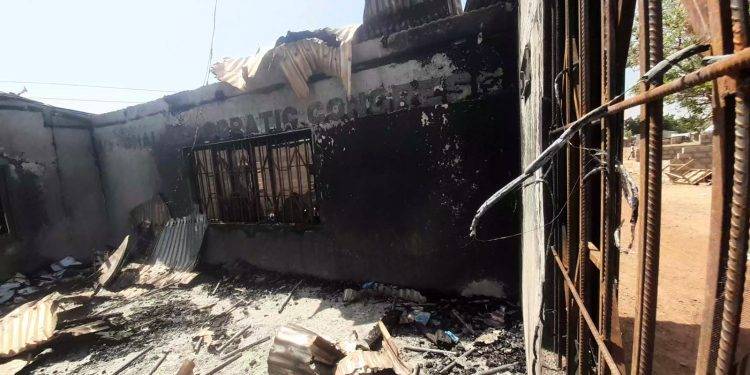Tensions boiled over in the Talensi Constituency of Ghana’s Upper East Region on Saturday, April 5, after the local office of the National Democratic Congress was set ablaze. The incident, which occurred around 2:30 a.m., came shortly after the announcement of John Millim Naabwomya as the party's nominee for District Chief Executive. The nomination has stirred strong opposition within sections of the NDC's grassroots supporters and is now at the center of a political controversy.
Eyewitnesses say the arson attack happened without warning, leaving the
party office in ruins. Although the actual perpetrators are yet to be
identified, many believe the fire is directly linked to the growing
dissatisfaction among some party members who have openly opposed the nomination
of Naabwomya. According to reports from residents, there were no injuries
recorded during the attack, but key party documents and property were destroyed
in the fire.
The core of the protest lies in the belief that Naabwomya’s nomination was
not based on consensus or broad support from the grassroots. Detractors argue
that his selection was influenced more by his personal connections than by his
merit or popularity within the constituency. Several voices in the party have
claimed that he was handpicked due to his close ties to the Paramount Chief of
Talensi, Tongraan Nanlebegtang Kugbilsong. This perceived interference by
traditional authorities has added fuel to an already charged political climate
in the area.
Adding to the controversy are concerns over Naabwomya’s alleged affiliations
with Chinese mining companies operating within the Talensi District. Residents
fear that if confirmed as DCE, he might prioritize the interests of these
companies over the well-being of the local population. Talensi is a district
rich in mineral resources, and mining activities, both legal and illegal, have
long been a sensitive subject among locals. Many feel the area has not
benefited enough from its natural wealth and that external players, including
foreign firms, have contributed to environmental degradation and social
tensions.
Opposition to Naabwomya's nomination is not new. In January this year, a
group of concerned party members submitted a formal petition to the NDC's
regional leadership, urging them to reconsider the decision. The petition
outlined various reasons why his appointment would create unrest in the area,
citing his perceived lack of connection with the grassroots and questionable
political alliances. Despite this early warning, the nomination was eventually
confirmed, which has now led to widespread backlash and the violent turn of
events.
Local authorities have launched an investigation into the arson, promising
to bring those responsible to justice. So far, no arrests have been made.
Security in the area has also been heightened to prevent any further
disturbances. Meanwhile, the party’s regional executives have remained largely
silent, fueling speculation about internal disagreements and possible divisions
within the leadership.
The destruction of the constituency office has left the party’s operations
in Talensi in disarray. Members who supported the nomination have called for
calm, asking all sides to engage in dialogue to resolve the situation. However,
there is still visible anger among youth groups and long-time party supporters
who feel ignored and sidelined in the decision-making process.
Political observers are now closely monitoring how the NDC will manage the
crisis. The incident not only threatens unity within the constituency but could
also affect the party’s image in the broader Upper East Region as it prepares
for the 2028 general elections. Leadership at both the regional and national
levels may be forced to revisit their internal nomination procedures to restore
trust among party faithful and avoid similar incidents elsewhere.
As the dust settles in Talensi, residents and political stakeholders are
calling for a peaceful resolution to the conflict. They want a fair,
transparent process in selecting leaders who represent the true will of the
people. With the area already dealing with development challenges, any
prolonged political unrest could derail efforts to bring growth and stability
to the community. For now, the political future of John Millim Naabwomya hangs
in the balance as the NDC works to calm tensions and rebuild trust among its
members.




No comments yet
Be the first to share your thoughts!